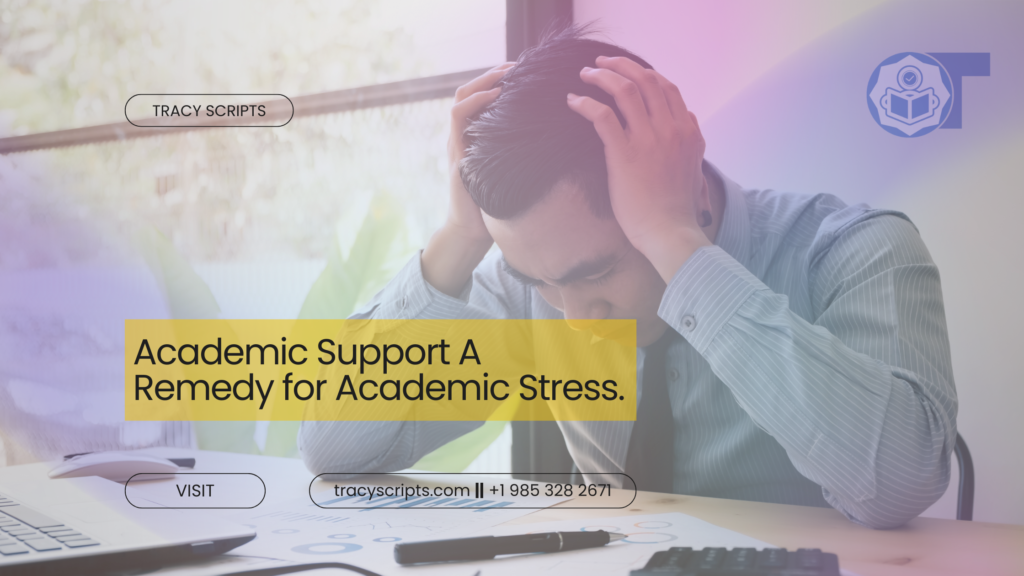Introduction
In today’s fast-paced educational environment, students are experiencing unprecedented levels of stress. From demanding workloads to the pressure of achieving top grades, academic life can become overwhelming. This stress is exacerbated by the need to balance extracurricular activities, social responsibilities, and family expectations. Prolonged exposure to such stress not only hampers academic performance but also poses significant risks to students’ mental and physical health.
Academic assistance offers a vital solution, providing students with the tools and support they need to manage their stress effectively while achieving their goals. By understanding the key causes of stress and the role of academic support, students, parents, and educators can take proactive steps toward fostering a more balanced and supportive learning environment.
The Rising Tide of Student Stress
Academic stress has become a defining challenge of the modern student experience. Recent surveys indicate that over 60% of students report experiencing frequent stress related to their educational demands. This rising tide of stress can be attributed to several factors:
- Heavy Workloads: The volume of assignments, projects, and exams often leaves students feeling overwhelmed. With tight deadlines and complex tasks, it becomes difficult to allocate sufficient time to each responsibility.
- Competitive Pressure: In an era where academic excellence is viewed as a gateway to future opportunities, students often face intense competition from peers. This pressure to outperform can lead to chronic anxiety and feelings of inadequacy.
- Time Management Challenges: Juggling academic obligations alongside extracurricular activities and personal responsibilities is a constant struggle for many students. Ineffective time management exacerbates stress, creating a cycle of procrastination and panic.
- High Expectations: The weight of parental and societal expectations can create an immense burden on students, who may fear disappointing those who rely on their success.
Stress manifests in various ways, from difficulty concentrating and irritability to physical symptoms such as headaches and sleep disturbances. Left unchecked, these stressors can lead to burnout, depression, and other long-term consequences, making it crucial to address the root causes.
What Is Academic Assistance?
Academic assistance encompasses a wide range of tools, resources, and support systems designed to help students navigate the complexities of their educational journey. This support can take several forms:
- Tutoring Services: Personalized tutoring offers students one-on-one attention to address specific academic challenges. Tutors help clarify concepts, provide study strategies, and build foundational knowledge.
- Online Resources: Digital platforms, such as Khan Academy, Coursera, and Quizlet, offer interactive lessons, practice exercises, and instructional videos that cater to diverse learning styles.
- Study Groups: Collaborative learning environments encourage students to share ideas, discuss topics, and solve problems collectively, fostering both academic growth and social connections.
- Mentoring Programs: Academic mentors provide guidance not only in subject matter but also in setting goals, managing time, and building confidence.
Academic assistance offers tailored solutions to meet individual needs, ensuring that students receive the specific support they require. This personalized approach is key to alleviating the stress that arises from a one-size-fits-all educational system.
How Academic Support Reduces Stress

Academic support plays a transformative role in reducing stress, empowering students to approach their studies with confidence and clarity. Here’s how:
- Simplifying Complex Concepts: One of the primary stressors for students is grappling with challenging topics. Academic assistance breaks down these topics into manageable segments, using relatable examples and step-by-step explanations. This approach not only aids comprehension but also helps students feel more in control of their learning process.
- Time Management Skills: Many academic programs include training in time management, teaching students how to prioritize tasks and create effective study schedules. By organizing their workload, students can reduce last-minute cramming and the accompanying stress.
- Confidence Building: Success in academics often hinges on confidence. Tutors and mentors foster this confidence by celebrating small victories and highlighting areas of improvement. As students master difficult material, their self-belief grows, reducing the anxiety associated with exams and assignments.
- Building a Routine: Structured academic support encourages students to develop consistent study habits. Regular sessions with a tutor or mentor create a sense of stability, which is essential for managing stress.
Psychological Benefits of Academic Assistance
Beyond academic improvements, academic assistance offers significant psychological advantages that contribute to overall well-being:
- Lower Anxiety Levels: Preparedness is a key factor in reducing anxiety. Students who receive academic help are better equipped to tackle tests, assignments, and presentations without the fear of failure.
- Improved Self-Esteem: Continuous progress in academics fosters a sense of accomplishment. Students begin to view challenges as opportunities for growth rather than insurmountable obstacles.
- Emotional Support: Tutors, mentors, and study group peers often provide a supportive network that students can rely on. This sense of community alleviates feelings of isolation and boosts emotional resilience.
- Coping Mechanisms: Academic assistance teaches students problem-solving techniques and stress management strategies that extend beyond the classroom, benefiting their personal and professional lives.
The Role of Parents and Educators in Facilitating Support

Parents and educators play a pivotal role in creating an environment where students feel comfortable seeking academic help. Their involvement can make all the difference:
- Normalizing Help-Seeking: By encouraging students to seek assistance without fear of judgment, adults help eliminate the stigma often associated with needing extra support.
- Providing Resources: Schools and communities should prioritize access to quality tutoring services, online platforms, and mentoring programs. This ensures that students from all backgrounds can benefit.
- Identifying Warning Signs: Parents and teachers must stay attuned to signs of stress, such as declining grades, mood swings, or withdrawal from social activities. Early intervention is critical in preventing stress from escalating into more severe issues.
- Being Supportive: Positive reinforcement and open communication create a safe space for students to discuss their challenges and explore solutions collaboratively.
Choosing the Right Academic Assistance
Selecting the right type of academic support is crucial to its effectiveness. Consider the following factors:
- Expertise: Ensure that tutors or resources are well-qualified and experienced in the specific subject areas where help is needed.
- Accessibility: Choose programs that are easily accessible, whether through physical proximity or online availability. Flexible scheduling is also important.
- Customization: Look for support services that adapt to the student’s unique learning style and pace. Generic approaches may not address individual challenges effectively.
- Affordability: While investing in quality assistance is important, there are many affordable or free options available, such as school-provided resources or community programs.
Balancing these considerations ensures that academic assistance delivers maximum benefit, helping students reduce stress and achieve their full potential.
Conclusion
Academic assistance is not merely a tool for improving grades; it is a holistic solution that addresses the physical, emotional, and mental challenges of modern education. By simplifying learning, building confidence, and fostering a supportive community, academic support transforms stress into success. Parents, educators, and students alike must embrace the value of academic assistance as an essential component of a healthy and productive educational journey. Prioritizing such support ensures that students are not only prepared for academic challenges but also equipped to thrive in life.
FAQs
1. What are common signs that a student needs academic assistance?
Signs include declining grades, difficulty concentrating, avoidance of homework, and visible frustration with challenging subjects.
2. Are there affordable options for academic support?
Yes, many schools and community centers offer free or low-cost tutoring, and numerous online platforms provide budget-friendly resources.
3. Can academics help improve skills beyond coursework?
Absolutely. Academic assistance often improves critical thinking, time management, and problem-solving skills, which are valuable in all aspects of life.
4. Is online academic assistance as effective as in-person support?
With advancements in technology, online academic assistance is highly effective, offering flexibility and interactive tools that enhance the learning experience.

